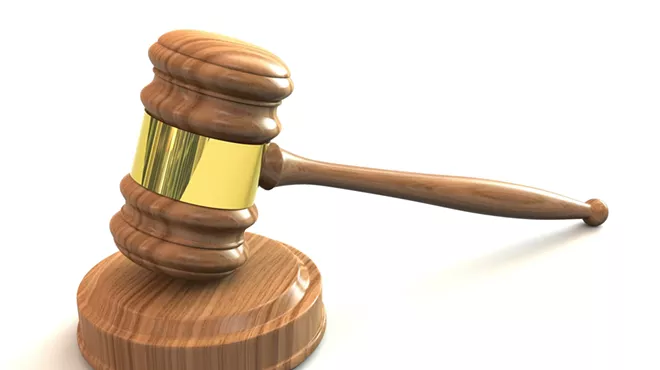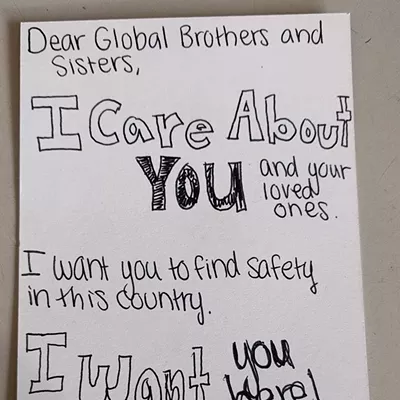More than once during the state Supreme Court candidate forum in Spokane, Justice Mary Yu turned to the challenger at her right. She smiled politely and remarked:
"Well, I'm pleased to say there are some things I agree with Mr. DeWolf on."
The crowd of about 120 people — mostly law students, lawyers and a few electorally minded citizens — let loose a collective chuckle.
DeWolf, a retired Gonzaga Law School professor who is running for Yu's seat on the Washington State Supreme Court, had just finished explaining his stance on the steep but necessary barrier to medical malpractice lawsuits. Those cases can be costly, in part, because most need an outside expert to weigh in. The two agreed on little else.
DeWolf and two other challengers are the first since the 1990s to challenge all three justices up for re-election. The challengers: DeWolf; former Kittitas County prosecutor Greg Zempel; and Dave Larson, presiding judge of Federal Way Municipal Court, are part of an effort by conservatives to rein in what some refer to as "judicial activism" in the state's highest court. The debate over the 2012 court's decision, known as McCleary, and its demand that the state legislature and governor take action in funding public education loomed large during the forum at Gonzaga University last week.
Candidates answered questions on judicial philosophies, the role of the court relative to the other two branches of government and how money plays a role in judicial elections — or if it should.
We've distilled the best of the forum below, but nearly all six candidates agree on one major challenge facing today's court: There is a lack of public confidence in the justice system. How to address the issue is another matter.
ON MONEY IN JUDICIAL ELECTIONS
Perhaps the most exciting moment of the evening surrounded the issue of money's influence in judicial elections. In Washington state, there are caps of $2,000 on individual political donations. However, contributions known as "independent expenditures" — money spent on political advertisements without the approval or permission of the candidate — aren't subject to the same restrictions.
Dave Larson, who is challenging Justice Charlie Wiggins, addressed the audience directly: "Free speech is free speech," he said. "Ladies and gentlemen, we're operating on a system of trust and ethics. We have to have a system where we elect people to make decisions based on the law and constitution without any outside influences."
Wiggins challenged Larson's stance: "I want to explain something to you," he said to Larson. "The difference is when you get a contribution from people, it's subject to being reported. When they're independent expenditures, there aren't limits, and you have a real problem with money coming into this court. The average voter just can't afford to put $100,000, $200,000, $300,000 into a race."
In a passionate response, Larson said it's insulting that a judge would be influenced by money, rather than the law or the constitution.
ON RESTRAINT VS. ACTIVISM
While the candidates agree that one of the biggest problem facing the justice system is confidence in the courts, they differ on strategies to restore that confidence.
Yu helped organize symposiums on topics ranging from the science behind adolescent brain development to pretrial detention practices to re-entry programs for those released from prison. Yu said she is proud of the unique education and community outreach opportunities they afford. Chief Justice Barbara Madsen agreed: "I think it takes courage to look in the mirror," Madsen said, as Yu nodded along. "You don't want the court to be an oppressor."
DeWolf and Zempel disagreed. DeWolf said the court's education of the public comes in the form of its decisions. Zempel cautioned against any real or perceived bias to which such a public event could expose the court.
"If you have a Supreme Court holding symposiums, tipping their hat or favoring one side or the other in arguments, that doesn't feel like it's a fair judiciary on those issues as they come before the court," Zempel said.
ON ALTERNATIVE SENTENCING FOR NONVIOLENT OFFENDERS
"My philosophy is no repeat customers," said Larson, the Federal Way municipal court judge. "Each case is an individual fingerprint, and you use the tools at your disposal to get them to change their behavior. Restorative justice is significant and needs to be used more. When you're required to talk about the impact of your actions, that somehow makes you more self-governing."
Zempel echoed support for restorative justice — where victims and offenders talk about the impact of the alleged offense — pointing to success with such practices in the juvenile justice system in Kittitas County.
He added that diversionary programs, such as drug court, demand participation and collaboration from everyone: judges, prosecutors, defense attorneys and the community.
Wiggins also touted the success of therapeutic courts' "tremendous role in reforming people rather than warehousing them."
This time, it was DeWolf and Madsen who diverged. Referencing Washington state's criminal sentencing guidelines, DeWolf said: "I think it's good that in recent years, judges have been subject to a more constrained view of what they are able to provide by way of sentencing, and that they ensure a higher degree of consistency from offender to offender. In years past, judges had greater discretion that was sometimes exercised in a way that was disfavorable to minority groups and those who had less standing in the community."
Madsen said the restrictions on judges' discretion and "creativity" has forced the judiciary to work closer with the legislative and executive branches toward solutions.
ON THE ROLE OF THE COURT IN THE SCHOOL-TO-PRISON PIPELINE
DeWolf and Zempel suggested this question is not necessarily one the court needs to answer.
"I think judges need to remember, we have many institutions in society — education, family, religion, community, sports — that shape people's behavior," DeWolf said. "In terms of changing those conditions that we regret, we may be over-emphasizing the extent to which the legal system has a solution. In many cases, the law needs to recognize the role that other institutions play and help those function properly, rather than assume there's a legal solution."
Yu addressed DeWolf's position that the courts have no role in the road from schools to prison: "It's the legislature that's increased court involvement in the truancy process," she said. "The Supreme Court doesn't look for cases to get involved with; rather, we support trial court judges who are actively engaged in the communities." ♦






















